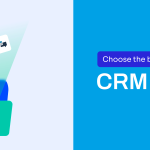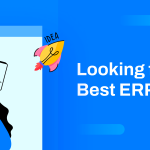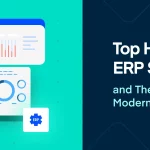Are you considering to implement an Enterprise Resource Planning (ERP) solution for your business?
Well, you have to consider several aspects ranging from your organizational strategies to business needs and resources. You also need to consider your business portfolio and organizational activities such as risk management, supply chain operations, procurement, and general management.
These activities are covered under a single ERP solution which helps to maintain them according to your present and future business plans and strategies.
Big organizations, particularly those who are operating in the business world, have huge market shares, corporate plans, and social associations. Behind all these operations, there is a well-defined system of connected resources which implement the business plans and strategies to ensure success.
So, the management of these huge tasks and activities has never been easy. In this article, we will guide you through every aspect of ERP systems so that you get a better understanding of ERP solutions and their best practices.
ERP at a Glance

ERP is a business management and processing system which helps organizations to apply integrated systems and software for managing the business activities and functions including technological operations, human resources, and business services.
ERP integrates all the functions of operation under one umbrella, which includes planning and development, production and marketing and sales.
ERP systems are supported by databases, which include the data from all the embedded systems of an organization. An ERP software integrates with the system and utilizes this data to streamline the business processes and information which is essential for the success of a business.
The advanced levels of ERP systems include software which is highly optimized to automate and report the processes.
What Does ERP Software Offer?
ERP software is an enterprise application which is designed to process the information and data of organizations to produce the desired results. Large businesses and organizations frequently need technical human resources to manage and analyze their data pertinent to their organizational processes and performance.
So, ERP software is of great help when it comes to managing the organizational data and processes. It offers:
- Defined and focused information technology cost.
- Visible and clear in processes.
- Planning, automation, and reporting of organizational data and processes.
- Customization through the implementation of individual applications attached to central software.
- Improved customer services and organizational efficiency.
- Enhanced collaboration.
One of the best ERP solution providers around us is Oracle. It offers a feature-rich ERP system for businesses. It includes management and procedural applications which integrates with your organizational processes to improve efficiency and effectiveness in process and business activities.
Oracle ERP Cloud offers cloud-based data processing, which can be applied to specific organizational processes including financials, procurement, project management, and enterprise performance.
So, the cloud-based ERP systems of Oracle is changing the way organizations implement the ERP systems and utilize them to manage and interpret their data and organizational resources effectively.
Are ERP Solutions Needed for even Small-Medium Businesses?
In the contemporary business world, small and medium enterprises continuously strive to expand their business portfolio. They also utilize their resources appropriately to extract maximum benefits for increasing their profits. However, these enterprises have specific requirements for resource management and data interpretation. Therefore, they have to watch out for the information technology cost, which is incurred with the implementation of different management software and applications.
The ERP solutions provide the facility to automate organizational processes. So, every organization can utilize them for automation and management purposes. For medium-sized organizations, ERP software can facilitate the data processing and management of manual tasks which otherwise consume huge human resources.
However, the organizations with small portfolios need to implement an ERP solution on the entire organizational systems to produce the desired results. They can accelerate their processes and management tasks with the help of ERP resources.
Thus, we cannot ignore the importance of ERP for medium level organizations.
How to Determine The Need for ERP Software for SMEs?
Businesses vary in sizes and scopes of providing specific products and services to customers. Majority of businesses with a small portfolio of services embed smart business tools and software to get their work done.

However, as the business portfolio expands, these businesses may need quick processing and data interpretation. At that time, the manual tasks in the organization could hinder the performance.
So, to increase the productivity level, the businesses need automation for quicker analysis and results. Accordingly, the ERP solutions automate the manual processes, including accounting, financial management, and management of clients’ data.
Furthermore, it provides an edge to business who provide customer support by processing the Customer Relationship Management (CRM) data.
So, the need for SRP solutions can determine if the company faces one of these situations, including:
- An increase in inventory in warehouses without proper management and data.
- The sales data management becomes difficult.
- Orders are not effectively processed.
- Business expansion activities face hurdles.
Benefits of ERP Solutions for Small-Medium Businesses?
ERP software brings immense benefits for organizations of every size and type. However, the organizations need to define their business horizon and managerial processes which are used to maintain the overall business processes. This is essential to utilize an ERP solution at its fullest and gain maximum benefits. Here are some of the benefits of an ERP system for small-medium organizations:
Improves Processes and Data Management
An ERP system work at the core level of management and data analysis. It includes data from every instance and interprets it to utilize maximum resources for boosting the productivity level. It manages data under one umbrella, and every department in an organization can access the corporate data without any hassle.
Thus, effective data management through ERP systems improves business processes and performance.
Improves Decision Making and Performance
Businesses have various activities which are performed to increases profits through improvements in processes and customer management.
Accordingly, ERP solutions provide real-time data to organizations to effectively strategize marketing and financial plans. Thus, the organizations can improve their decision-making process by utilizing the interpreted data provided by the ERP software.
Considerations to choose an ERP software

Businesses need to take viable decisions to keep the processes running in the right direction. Every business strives to save cost and automate the processes for gaining long-term benefits. An ERP system can be of great help to achieve this objective.
However, there are several considerations needed to choose and implement ERP solutions. Here are some of the considerations for businesses to choose compatible ERP software:
Business Goals and Objectives
The most important task for businesses in today’s fast-paced business environment is to achieve the set goals and objectives which mostly revolve around business performance, survival, and future expansion.
So, every business needs to comprehend its goals, including growth plans, efficiency goals, and expansion plans. These determinants are important to consider while choosing ERP software productive enough to manage them and produce outstanding results.
Software Requirements
Analyzing the software requirements by the company’s portfolio and deliverance of services in an important task. It provides detailed information related to procedural and management data, which is to be interpreted with the help of the ERP software.

So, for choosing the right ERP software, you need to review all the data and processes which are to be included in it.
Technology Requirements
Shifting your business processes to an ERP system may require advanced technology and underlying applications which are essential for the effective working of the system. So, consider the technology components as a crucial part of ERP software implementation because it incurs technology cost along with the training and development of employees for handling the new system.
Cost and Resources
ERP software incurs a specific cost, which varies for every business. It depends on business requirements and data management process, which are to be automated for quick results. Some businesses need medium functionality for main business processes only.
However, big organizations need more advanced ERP software to manage their processes. So, you must verify the cost of an ERP software which meets your budget and organizational needs.
How to Perfectly Utilize Your ERP Software

Utilizing ERP software for achieving the set goals of automation and data management is an essential part of its implementation. Businesses invest in ERP systems, and they have to manage them to improve performance and productivity level. To effectively utilize ERP software, businesses need to:
Integrate the ERP system with suppliers and customers.
- Utilize analytical tools and applications.
- Define business processes to discard the old processes gradually.
- Effectively spread information across the organization.
- Standardize organizational data and processes.
In this regard, Michael L. George, author of The Lean Six Sigma, has said, “Reduce complexity through standardization”. George has also pointed out the main purpose of implementing ERP software, which is the standardization of business processes. Furthermore, Ken E. Sebahar said, “Be open to new ways to accomplish the same goal”. It implies that business can make effective use of ERP software for getting extra-ordinary benefits, which can help them to streamline their processes and improve management.
ERP Solution within The WordPress Industry: Facts You Should Remember
WordPress ERP software is a new way to manage online businesses. WP ERP plugins have made it possible for a small and medium business to manage their resource and allocate them for enhanced performance. You can automate various processes including accounting, CRM and Human Resource Management (HRM). Furthermore, you can also make use of Word Press CRM to enhance the functionality of your ERP system.

Businesses need to consider the WP ERP because it is open-source and free ERP solution. It comes with several useful extensions for advanced processes.
So, if you plan to implement an ERP solution with advanced features for your small and medium level business, then WP ERP is the right choice. It gives you an idea about how an ERP system works and how it can be useful for your business.
Remember that one-third of total websites are running on Word Press. So, if you are also running a Word Press website, then you are lucky enough to embed WP ERP in it.
Final Thoughts
ERP systems are providing outstanding benefits to businesses by automating their processes and management. Furthermore, businesses need to improve their efficiency level to cater to the maximum customer. For this purpose, the ERP systems are best-suited, and they provide several functions which can be utilized to report and analyze business data for making effective business strategies.
However, businesses should analyze their requirements before choosing an ERP system because it is meant to increase efficiency by reducing the overall cost.
So, are you interested in getting free ERP software for your business?










1 thought on “A Guide To ERP Solutions: Essential Features And Best Practices”